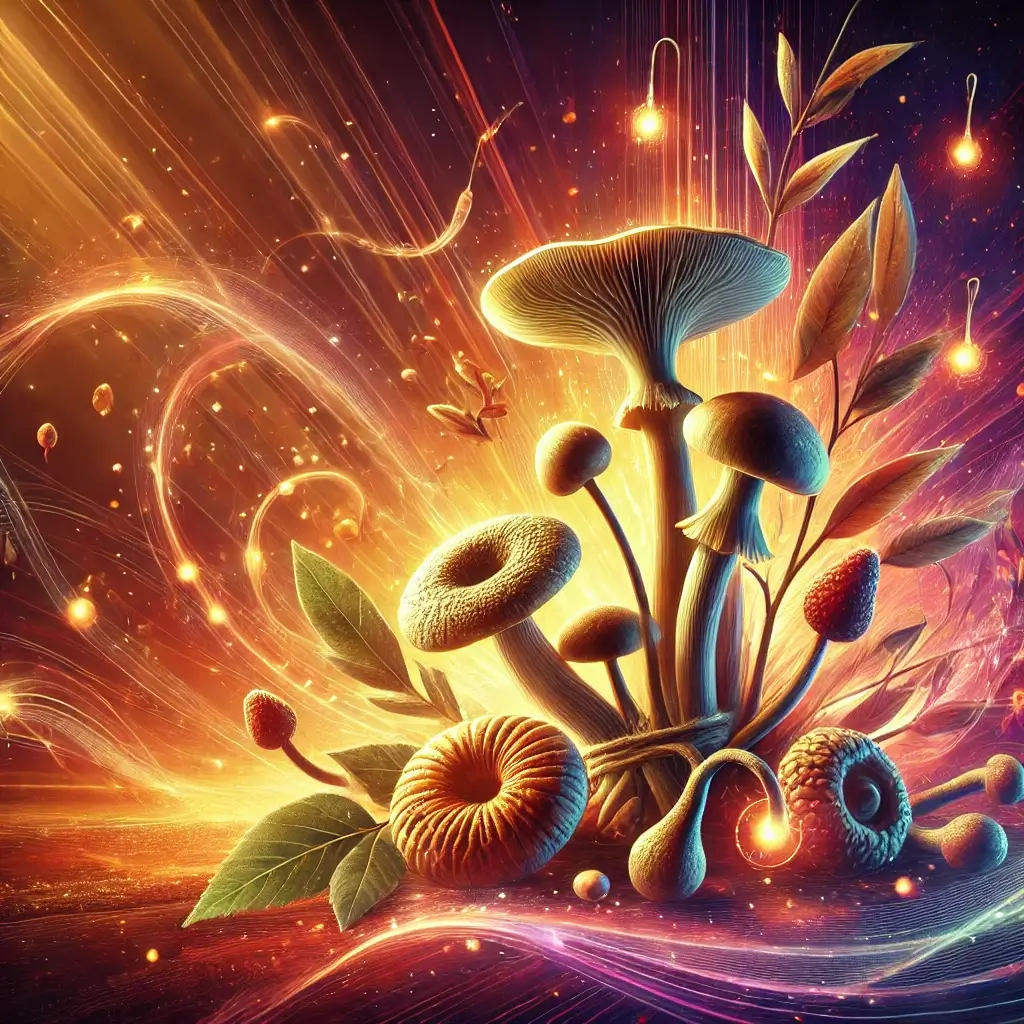Natural Nutrition for Enhanced Vitality
Consume a nutritious diet that includes lots of fruits, vegetables, and whole grains. Limit your intake of processed meals, fizzy drinks, and harmful fats.
The Foundation of Sustained Energy
Maintaining a well-balanced diet is one of the greatest strategies to increase your energy levels. Eating a range of meals high in vitamins, minerals, and other necessary nutrients helps boost your metabolism and give your body with the energy it requires to perform optimally. Avoiding sugary and processed meals can also help you avoid energy dumps and maintain consistent energy levels throughout the day.
Powerful Fungi for Natural Performance Enhancement
Medicinal mushrooms can increase your vitality and stamina, making them an excellent choice for people looking for a natural energy boost. The following are some of the most popular medicinal mushrooms for improved energy:
Cordyceps: The Athlete’s Secret Weapon
Cordyceps mushroom is well-known for its potential to boost athletic performance and endurance. It has also been demonstrated to increase energy and decrease weariness.
Reishi: The Stress-Fighting Fungus
Reishi mushroom: Reishi mushroom has adaptogenic characteristics, which means it can assist the body cope with stress. Reishi mushroom has also been demonstrated to improve sleep quality, which can result in more energy.
Chaga: Antioxidant Powerhouse
Chaga fungus is well-known for its strong antioxidant content. Chaga mushroom has also been proved to increase energy and decrease weariness.
Versatile Consumption Methods
Capsules, powders, teas, and extracts are some of the ways medicinal mushrooms can be eaten. They can also be mixed into meals and beverages.
Medical Guidance Is Essential
It is essential to consult with your doctor before consuming medicinal mushrooms for enhanced energy. Because medicinal mushrooms might interact with certain drugs, it is critical to be informed of the dangers and advantages before using them.
Holistic Approaches to Energy Enhancement
Here are some additional things you may do to boost your energy:
The Critical Role of Restorative Sleep
Sleep enough: Aim for 7-8 hours of sleep every night.
Sleep is also essential for sustaining high levels of energy and stamina. When you don’t get enough sleep, your body’s capacity to repair and rejuvenate is hampered, resulting in weariness and poor performance. Aim for seven to eight hours of sleep every night to give your body the rest it requires to function effectively.
Movement as Medicine for Vitality
Exercise on a regular basis: Aim for 30 minutes of moderate-intensity exercise on most days of the week.
Exercise on a regular basis is another excellent technique to increase your energy and stamina. Regular physical exercise can help improve your cardiovascular health, boost your endurance, and strengthen your strength. Even little spurts of movement throughout the day, such as going for a quick walk during your lunch break, can help raise your energy and general health.
Managing Mental Energy Drains
Control your stress: Stress can cause weariness and poor energy levels. Find healthy stress-management techniques such as exercise, yoga, or meditation.
Daily Alertness Through Intentional Practices
You may feel more awake and focused throughout the day by taking efforts to boost your energy levels.
Physical Performance Optimization
Increasing your energy and stamina is critical if you want to increase your overall physical performance. There are various strategies to do this, including eating a nutritious diet, getting adequate sleep, and exercising on a regular basis.
The Path to Vibrant Living
To summarize, increasing your energy and stamina is critical to improve your physical performance and overall health. You may boost your energy levels and enhance your overall quality of life by adopting healthy behaviors such as eating a well-balanced diet, getting adequate sleep, and indulging in regular exercise.
References
[1] Chang, S.T., & Wasser, S.P. (2012). The role of culinary-medicinal mushrooms on human welfare with a pyramid model for human health. International Journal of Medicinal Mushrooms, 14(2), 95-134.
[2] Panda, A.K., & Swain, K.C. (2011). Traditional uses and medicinal potential of Cordyceps sinensis of Sikkim. Journal of Ayurveda and Integrative Medicine, 2(1), 9-13.
[3] Wachtel-Galor, S., Yuen, J., Buswell, J.A., et al. (2011). Ganoderma lucidum (Lingzhi or Reishi): A Medicinal Mushroom. In: Benzie IFF, Wachtel-Galor S, editors. Herbal Medicine: Biomolecular and Clinical Aspects. 2nd edition. Boca Raton (FL): CRC Press/Taylor & Francis.
[4] Lull, C., Wichers, H.J., & Savelkoul, H.F. (2005). Antiinflammatory and immunomodulating properties of fungal metabolites. Mediators of Inflammation, 2005(2), 63-80.
[5] Kuo, Y.C., Tsai, W.J., Shiao, M.S., Chen, C.F., & Lin, C.Y. (1996). Cordyceps sinensis as an immunomodulatory agent. The American Journal of Chinese Medicine, 24(2), 111-125.
[6] Watson, S. (2021). Sleep and metabolism: The multitasking of sleep. Harvard Health Blog, Harvard Medical School.
[7] Booth, F.W., Roberts, C.K., & Laye, M.J. (2012). Lack of exercise is a major cause of chronic diseases. Comprehensive Physiology, 2(2), 1143-1211.
[8] Brosschot, J.F., Gerin, W., & Thayer, J.F. (2006). The perseverative cognition hypothesis: A review of worry, prolonged stress-related physiological activation, and health. Journal of Psychosomatic Research, 60(2), 113-124.
